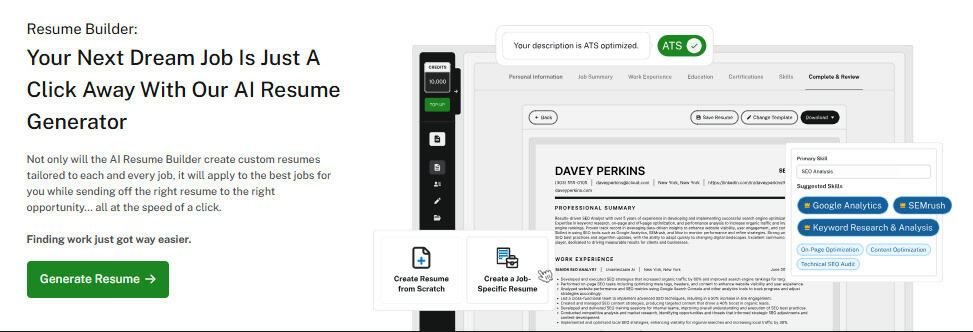You’ve probably asked yourself this at some point: Do I really want a corporate job, or am I just following the crowd?
Maybe you’re fresh out of school and staring at job listings full of titles like “Account Manager” or “Junior Analyst” without really knowing what those roles mean.
Or maybe you’re already working in a corporate setting, feeling a bit lost, and wondering if this is all there is.
So, what is a corporate job, really? (Beyond the suits, cubicles, and structured workdays, of course!)
If you’re torn between the pros and cons of corporate life, this blog is for you.
We will walk you through exactly what a corporate job is, the ups and downs that come with it, and how to decide if it’s the right path for you.
Definition: What Is a Corporate Job?
The phrase corporate job sounds fancy. Well, it is.
It typically means being employed at a large company with an established reputation for working for profit.
However, these companies don’t exactly have to be top dogs in their relevant industries.


Never Worry About AI Detecting Your Texts Again. Undetectable AI Can Help You:
- Make your AI assisted writing appear human-like.
- Bypass all major AI detection tools with just one click.
- Use AI safely and confidently in school and work.
They can be as big and mighty as Google or Amazon, or could be lesser known, too. It’s their structure that sets them apart from other businesses.
Corporate companies have a rigidly defined structure with defined departments and a proper chain of command. There are managers, directors, supervisors, executives, and trainees.
Such workplaces are more professional, formal, and follow clearly outlined rules and regulations to operate.
Moreover, all employees in the company are a part of a bigger team. Everyone works together to achieve the same goal, i.e., the firm’s mission and vision.
Examples of Corporate Job Titles
Now that you know what is considered a corporate job, let’s talk about some corporate job titles!
Corporate jobs can differ everywhere. It usually boils down to the department, level of experience, and the nature of the company.
However, you might come across the following common job titles on your job hunt:
Entry-Level Positions
- Marketing Assistant
- Junior Analyst
- Customer Service Representative
- Sales Associate
- Administrative Assistant
- HR Coordinator
Mid-Level Positions
- Project Manager
- Account Manager
- Financial Analyst
- Marketing Specialist
- Operations Supervisor
- IT Support Lead
Senior-Level Positions
- Marketing Manager
- HR Manager
- Senior Accountant
- Product Manager
- Business Development Manager
- IT Director
Executive-Level Positions (C-Suite):
- Chief Executive Officer (CEO)
- Chief Financial Officer (CFO)
- Chief Operating Officer (COO)
- Chief Marketing Officer (CMO)
- Chief Technology Officer (CTO)
As mentioned above, job titles can vary between companies. One company’s “Coordinator” might be another’s “Associate.”
Just to be clear, make sure to always read the job description carefully to know what you’re getting into!
The twist comes when you start applying to corporate jobs.
Let’s say you are a financial wizard. When we think about finance, we often picture Wall Street or investment banking, but corporate finance is its own world with unique roles.
But what is an example of a job title in corporate finance? One that comes up often is Treasury Analyst.
In this role, officers look into the firm’s cash flow, investments, and financial strategy.
Other titles in this space include Budget Analyst to Director of Corporate Finance.
These roles might have similar or overlapping job descriptions. However, you can’t send the same resume to apply for all of them.
That’s a big no.
You need to tailor your resume to match the specific requirements of that role. Sounds too much? The good news is, you don’t have to do this on your own.
Instead, you can use Undetectable AI’s Resume Builder to create or modify your resume and make it perfect for different job roles.

Characteristics of Corporate Jobs
Knowing what is a corporate job examples isn’t good enough. You must also learn the characteristics of corporate jobs.
So, burn the following corporate job characteristics into your brain.

Structured Work Environment
Unlike small-sized businesses where one individual wears different hats, corporate jobs have clearly defined roles, responsibilities, and reporting lines. Everything is run by the book, and a proper chain of command is followed.
Fixed Working Hours
Most corporate roles follow a regular 9-to-5 (or similar) schedule. However, since the pandemic, more and more companies are changing their models to hybrid or flexible work options.
Stability and Predictable Pay
Corporations mostly offer a stable and sustainable job. (The biggest perk, if you ask me!) You also get your salary on time, along with other allowances and occasional bonuses.
Career Growth
Climbing up a corporate ladder is a real thing. People can move from junior to senior, manager to director, as long as they perform well!
Performance Reviews and KPIs
The corporate world usually tracks every employee’s progress using formal metrics like KPIs (Key Performance Indicators).
These KPIs play a huge role in your promotion or future at the company.
Formal Dress Code (Sometimes)
While this entirely depends on the company’s culture, corporations mostly expect you to dress up in formal business attire. However, that’s changing, too.
Companies like Meta, Google, and Apple are few of those companies that don’t require formal dress code.
However, sectors like banking, finance, law, and insurance require employees to dress up formally for work.
Training and Onboarding
Corporate jobs usually offer some kind of training when you join. This could be anything from a short orientation to a full-onboarding process.
This helps employees get familiar with the work environment and specific tools the company uses.
Types of Companies That Offer Corporate Jobs
When most people think about a corporate job, they imagine skyscrapers, boardrooms, and long email threads.
Well, they’re not entirely wrong. But corporate roles exist beyond that, too (across different industries).
Here are some examples.
1. Tech Companies
Tech companies are always big on corporate jobs.
They have software engineers to build the product, but they rely on corporate teams to manage operations smoothly at the end of the day.
Examples: Google and Apple.
2. Financial Institutions
Banks, investment firms, and insurance companies are classic examples of corporate-heavy workplaces.
They hire for roles like financial analysis, compliance, and risk management. These firms offer stability, competitive compensation, and a traditional structure.
Examples: Bank of America and Morgan Stanley
3. Multinational Corporations (MNCs)
These are the big players with offices all over the world.
MNCs offer a wide range of corporate jobs across departments and often have formal training programs, global career paths, and strong employee benefits.
Examples: Procter & Gamble and Nestle.
4. Healthcare & Pharmaceutical Companies
Behind every hospital, clinic, and pharma brand is a corporate team handling operations, supply chains, HR, billing, marketing, and more.
These companies have large administrative departments that need skilled professionals to keep everything running smoothly.
Examples: Pfizer, Johnson & Johnson
5. Retail & E-Commerce Companies
The retail world is no less behind in offering tons of corporate opportunities.
You’ll find roles in logistics, product development, marketing, finance, and customer experience.
Examples: eBay, Nike.
Pros and Cons of Corporate Jobs

Corporate jobs can look pretty appealing from the outside. After all, everyone loves a high-paying job, free coffee, and a fancy title.
But like anything, they come with both perks and trade-offs.
If you’re considering stepping into the corporate world, this pros and cons list below will give you an idea about what to expect:
Pros
- Job Stability: Many corporate jobs offer long-term employment with structured contracts, health benefits, and retirement plans. If you’re looking for security, this is a big plus.
- Clear Career Paths: You often know where you stand and what it takes to climb the ladder. Promotions, performance reviews, and professional development programs are usually built in.
- Benefits & Perks: I’m talking health insurance, paid vacations, bonuses, stock options, gym memberships, and maybe even free lunches—depending on the company.
- Training & Skill Development: Corporate jobs usually provide access to workshops, courses, and mentorship programs to help you grow in your role.
- Networking Opportunities: Working in a larger company puts you in contact with people across departments and industries. This is quite valuable if you want to grow your career or explore new fields.
Cons
- Less Flexibility: Many corporate roles still stick to a 9-to-5 schedule and expect you to be available during “company hours.” As someone who’s been there, trust me, it doesn’t always suit your lifestyle!
- Office Politics: Working your way through office dynamics can be tricky. Promotions don’t always go to the hardest workers…sometimes it’s about who knows who.
- Bureaucracy: Corporate environments have layers of approval, rules, and red tape. If you’re someone who likes to move fast or work independently, this can feel limiting.
In the end, it’s all about what works best for you.
Corporate jobs can be a great fit if you value structure, stability, and growth, but they may not be ideal if you crave flexibility and autonomy.
How to Get a Corporate Job
Once you understand the meaning of what is a corporate America job, it’s hard to resist the appeal.
Surprisingly, applying for corporate jobs isn’t as complicated as one might think.
In fact, you can land a corporate job in many ways.
Gain Relevant Skills
As mentioned previously, corporations have a well-defined structure where every employee is responsible for highly specific tasks.
Make sure you have the relevant hard skills and also soft skills to excel in the roles you are interested in.
Networking
It’s always a great idea to start with people you already know. See if any of your friends have a vacancy in their companies.
You could also attend events and conferences to expand your professional circle. Remember, they can’t want it if they have never seen it.
Promote yourself among the right people!
Professional Platforms
Social platforms like LinkedIn are the best for job hunting. Connect with professionals and scroll through job postings to see if anything interests you.
If you need any help applying for jobs, you can get help from AI. For example, you can use Undetectable AI’s Smart Applier.
For even better results, polish your application materials using Humanize AI.

It helps transform AI-assisted content—like resumes or cover letters—into natural, human-sounding writing that aligns with your tone and voice.
This ensures your application feels authentic while still meeting professional expectations, helping you stand out in a sea of robotic submissions.
You can connect it with your LinkedIn account, and it will automatically send out job applications for relevant openings.

Utilize the widget below to try our AI Detector and Humanizer today.
Final Thoughts: Is a Corporate Job Right for You?
You asked, “What is a corporate job?” We answered!
However, keep in mind that even roses have thorns. A corporate job sure looks like a dream come true on the outside, but that’s not always the case with everyone.
While some may like its defined structure, others might find it too rigid. While some may appreciate the fixed work timings, others might think it’s a bad work-life balance.
All things considered, whether or not a corporate job is right for you depends on your preferences.
Do you like following the rules, or do you want to be the one rewriting them?
The ball is in your court!
Try our tools today and make your words work for you. Explore Undetectable AI.
